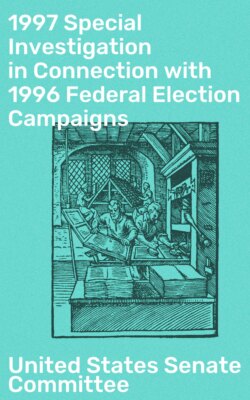Читать книгу 1997 Special Investigation in Connection with 1996 Federal Election Campaigns - United States Senate Committee - Страница 23
На сайте Литреса книга снята с продажи.
The Roger Tamraz Affair
ОглавлениеTable of Contents
Lebanese-American businessman Roger Tamraz tenaciously pursued his agenda with the U.S. Government. “If they kicked me from the door,” Tamraz told the Committee, “I will come through the window.” Unfortunately, his eagerness to promote his business schemes and enlist the government’s support against the vehement protests of U.S. national security experts found itself an ally in the cash-hungry DNC. The story of Tamraz demonstrates, perhaps better than any other episode of the Democratic fundraising scandals, that nothing was sacred in the President’s desperate search for campaign funds: no corner of the U.S. Government—not even the Central Intelligence Agency (“CIA”) or the NSC—was off limits.
An international businessman with significant involvement in the oil business, Tamraz was wanted by French police and faces an Interpol arrest warrant for embezzlement in Lebanon. Tamraz was willing to invest great energy, and significant sums of money, to secure U.S. backing for his oil pipeline project in the Caucasus. Rebuffed by officials at the NSC who regarded his schemes as untenable and harmful to U.S. foreign policy interests, he began making huge contributions to the DNC. As Tamraz had intended—and as he admitted to the Committee in his remarkably candid testimony—these contributions enabled him to enlist senior party officials like Fowler in helping Tamraz gain the access to senior U.S. officials that a high-level inter-agency working group had determined to deny him. His contributions—both directly to the DNC and to various state Democratic campaigns at Fowler’s personal direction—also won Tamraz the DNC chairman’s intercession in a series of highly inappropriate contacts with CIA officials. In at least two conversations with a CIA clandestine operative named “Bob,”8 to whom he had been referred by Tamraz and who had already been “lobbying” the NSC on Tamraz’s behalf, Fowler asked the CIA officer to help him “clear Tamraz’s name.” Fowler even telephoned NSC staffer Sheila Heslin to inform her that “Bob” would soon be sending her information about Tamraz. (Despite taking notes of his discussions with Tamraz about Bob, despite talking with “Bob” on at least two occasions, and discussing the CIA officer with NSC staffers Nancy Soderberg and Heslin, Fowler continued to deny any memory of his CIA contacts). After Tamraz was “disinvited” from an October 1995 event with Vice President Gore by the NSC, his DNC allies arranged for him to attend a dinner with the Vice President at the home of Senator Edward Kennedy. Despite the NSC’s determined efforts to deny him access to President Clinton, Tamraz’s DNC contributions bought him no fewer than six private meetings with the President.
Tamraz took the opportunity to discuss his pipeline with President Clinton at a White House dinner on March 27, 1996. The President assured Tamraz that someone would “followup” with him, and detailed Presidential advisor Thomas F. “Mack” McLarty to look into the matter the next day. Tamraz next met the President at a White House coffee on April 1, 1996, at which, Tamraz discussed his pipeline ideas with McLarty. McLarty asked Energy Department employee Kyle Simpson whether some reason could be found to support Tamraz’s pipeline. When Simpson conveyed McLarty’s instructions to his colleague John Carter, he told Carter that Tamraz had donated $200,000 to the DNC and was considering giving an additional $400,000.
The nadir of the Tamraz episode occurred with Carter’s subsequent call to NSC staff member Heslin, who chaired the inter-agency working group that had sought to deny Tamraz access to senior government officials and who had determined that the U.S. should not support his pipeline. Carter told Heslin that if she reconsidered her opposition to Tamraz, it “would mean a lot of money for the DNC” because “he’s already given 200,000, and if he got [what he wanted] he would give the DNC another $400,000.” Heslin refused, despite Carter’s claim that “the President really wanted” this and threats that McLarty might exact reprisals against her.
